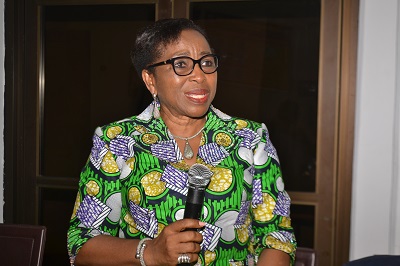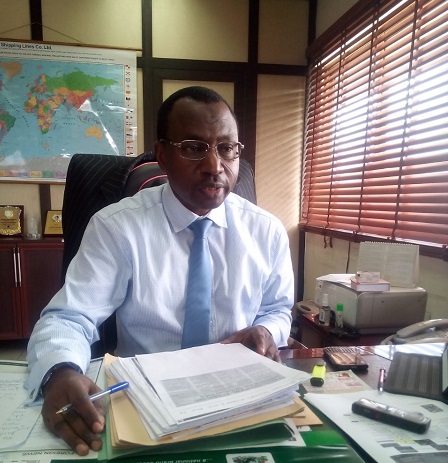How Government Policies Affect Shipping Business

Chief Emmanuel Nweke is the Chief Executive Officer (CEO) of International Trading and Contracting Ltd., a group of company which is into terminal operations, ship agency and licensed customs agency. In this interview, he elucidates how irregular government policies have crippled shipping business in Nigeria; he calls the attention of the Federal Government to the untapped areas in the maritime domain, among other salient issues in terminal operations and the entire maritime industry. Enjoy the chat.
As a ship agent, what can you say is the problem of indigenous ship owners that makes them to be where they are today?
Basically, the indigenous shipping agents who ought to have metamorphosed into full carriers today are where they are because of the policy of our government and there is no very clear support for the indigenous shipping agency and shipping companies in Nigeria. It is unfortunate that is what it is because it is supposed that the child that is born today is expected to grow and at a time, becomes a parent too to other children that are expected to come out of the growth but that is not happening in this country because of our policies. It is our hope that the Minister of Transport which other very important arms of shipping related affairs are under. We will begin to see very important reason towards making policies that will support indigenous shipping companies and other things that have to do with the maritime industry in our country.
Talking about government policies; but there are foreign shipping lines that are thriving very well in Nigeria. Why is it so?
Absolutely yes, the foreign shipping companies that are doing very well in Nigeria come into Nigeria with the support of their government. You know fully well that any vessel that you see plying any country of the world is built in a country making a visit to another nation. So, it is absolutely very clear that most of these shipping companies that are coming are only coming because they know that our government have not done all that is necessary to support the indigenous shipping companies in Nigeria that is why they seize the opportunities against the indigenous operators that ought to have been able to share in this huge market that we have our country. Most of the time upon investigation, many of the times, the cargoes that are brought into Nigeria are also cargoes that are generated by Nigerians outside this country. So, back to back it is beneficial to the foreign companies that have come here. It is quite unfortunate but that is where we are. The enabling laws, enabling environment, the enabling support to our indigenous entrepreneurs is not helpful.
How well have the indigenous shipping companies risen to the occasion?
Definitely, it has always affected every association in this country. Many at times, many of the associations in different areas of their endeavors have all stood up for their people but what are returns on that? Most of the time, it absolutely amounts to nothing because if you want to take in your return of any good business, it is the gain and that does not happen because of the same issue of our policy. So, sometimes it becomes very difficult to look at the associations because associations are now by people and these people are Nigerians and they are all also answerable to the government. That is also a problem.
As a terminal operator, how would you assess the terminal operators in Nigeria today?
Absolutely, no terminal operator today can boast of a sound growth unless about one or two that is extremely lucky. Mark my world “extremely lucky to have gotten government patronage one way or the other at a certain time in the life of the terminal. That time the government was much favorable to them, they were able to get favorable businesses for the company. Such are the few.
Are you saying indigenous terminals cannot thrive well without government patronage?
Absolutely, I have not seen that which has thrive very well because first of all, you are at the backs and calls of shipping companies who are foreign companies who have also come here to demand for terminals for themselves, who have made it impossible for indigenous terminal establishments to survive. So, you either sell your terminal to them or lease it to them for the packing of empties. Unless when they wish that they will give you few cargoes. At hand, you must reduce the level of employees you have, the manpower must be cut down because terminal is about manpower. In all ramifications if you employ manpower, you are employing your people but in the case where the terminal is turned to strange, you don’t need much people to store containers but when it is operating as a terminal, you need number of people to do examination.
What do you need to operate as a terminal order than storage as you said?
A lot, before now, Nigerian Ports Authority (NPA) had been allocating vessels to every terminal that have been licensed by NPA outside the port in order to decongest the port area and also being business close to people are importing goods. That is the essence of private terminal operators and that has been defeated by some foreign politicians that have come into the country and have been able to convince our government that they could run our ports better and that is where we are. So, ninety percent of the indigenous terminal operators are either dead or managing to survive. That is the full condition today.
Why is it that terminal operators charge for rent and demurrages on public holidays and weekends even when they know they are not officials’ working days?
That is unfortunate that is happening in our country. It is something that is inexplicable, to me, I do not see the rationale in charging on public holidays that the government has declared holidays that there shouldn’t be work but it is charged and it is absolutely wrong. It is not supposed to be so, it is not done so in any country of the world except I am meant to see where such action is taken but I have not seen anywhere. It looks like an open robbery.
But you are a terminal operator; do you charge some in your terminal?
Of course we do but that is not right in a position like this where we have so many terminals. For me to speak it out, it is to tell you that it is not right. So many may not be happy for my comment today but that makes no difference as far as I am concerned. I am a Nigerian; somebody must speak out and redirect them, inform them and make our regulation to wake up to such responsibility.
You recent served as a consultant to the Ministry of power where you facilitated the release of 248 containers of electrical equipment held in the port for the past eleven years. What is the implication of such delay to the economy?
Thank God for the present government who has decided to take the bill by the horns and point their feet down for the interest of every Nigerian. The effect of that to our economy is enormous.
Everything that is done in this nation today needs light to survive, need, light for progressing and if it were able to see these cargo to their various point, and does very important area of project completed and thousand of hundred megawatts that are made available for Nigerian to enjoy these life, that will help both the blue-chip, the start up to really help and turn these economy help the number of our youth, who live university who can as well as on their own be an entrepreneur, they need life to be able to be a successful entrepreneur in any form you look at it, you can have an office without light, you can’t operate computer without light. At the same time, if you are an architect you can’t draw without light you need to print them out, you need to expand it.
Don’t you think there could still be some containers held in the port for such a long time up till now?
Actually, you know there is a clear timeline that the government has given for any cargo imported into the country that are left in the forest or in any terminal around the country, you have a period of ninety days, after which the government take it over in other to decongest the port at the same time, be a deterrent to the importer or shippers who will accept cargo and fell very comfortable living in the port area with bothering the owner to come and take it out, that becomes a deterrent to them, when the government take it and decide what they want to do with it. They can destroy; they can sell it they can do anything they wish is possible than to be deterrent to whoever that have done that, that is the way it is. When that decision is taken by the government, whoever they gave it to are free to go to the port, pay whatever the government have requested them to pay, you are not to tell the shipping no demurrage unless there is certain amount the government have issued by Nigeria Customs Service, that’s all.
Why the equipment having kept more than 90 days not auctioned?
As you know, it has been government after government and as government changes hands, policy changes hands so I wouldn’t know why it was not options, but I believe that so many discussions would have been held on this container and again, the polities at that moment might be a bottle neck towards achieving that at that time or it might not be very important to the government at that moment to see that this is done. But these present government, have state that, we must get power to the people, so whatever be the issue before now that these were not able to be achieved, we will surmount those problems and make sure these cargo are delivered cite.
It has been said severally that there are some potentials in the maritime that are yet to be tapped. Do you believe so and what are they?
Absolutely, maritime industry is a great industry; I also want to remind you that even the oil that is viewed as the biggest earner of this country is made out of maritime industry. You cannot transport the oil without a sea, you cannot transport the oil without the vessels that ply the sea. The people who are manning the vessel must undergo trainings that have to do with maritime. So, 90% of the survival of our economy is maritime based. Then you talk about so many areas that are untapped that is the wish of some of us in the maritime industry that the government should look into the maritime and develop it for the benefit of the country. Many riverine areas are wonderful places; places of attraction; places that could be developed for tourism and you can reach there through the boat. In other words, sea transport has not been tapped in this country and that could be used in moving a certain level of cargoes and that will also help in saving our roads.







